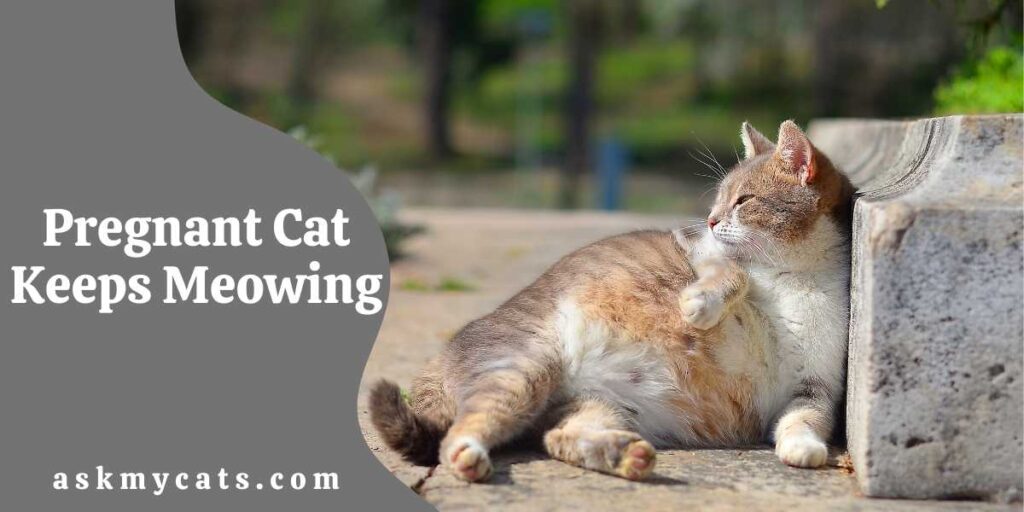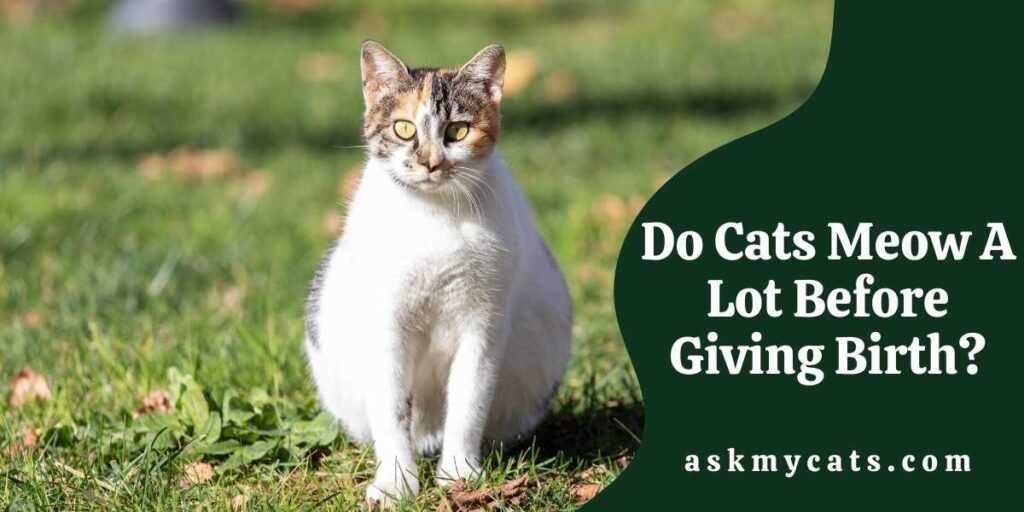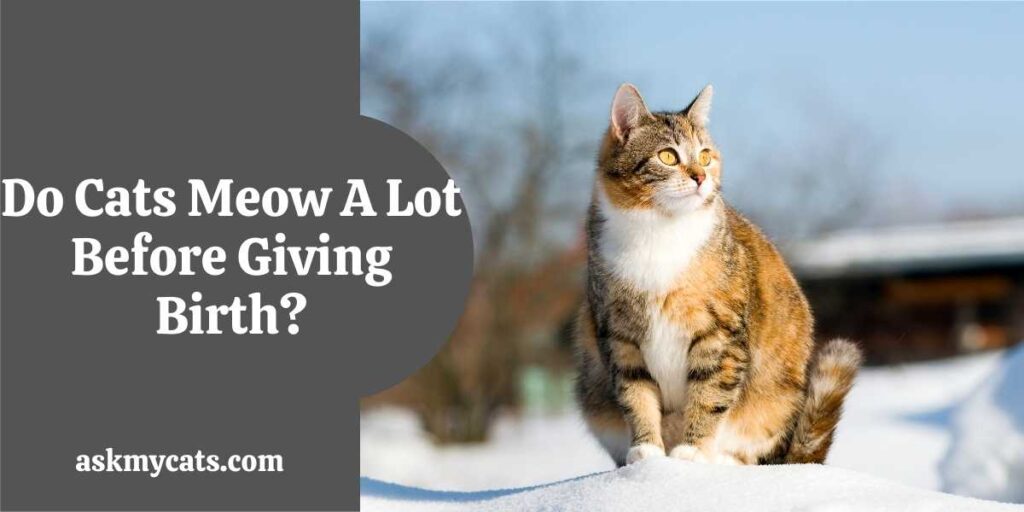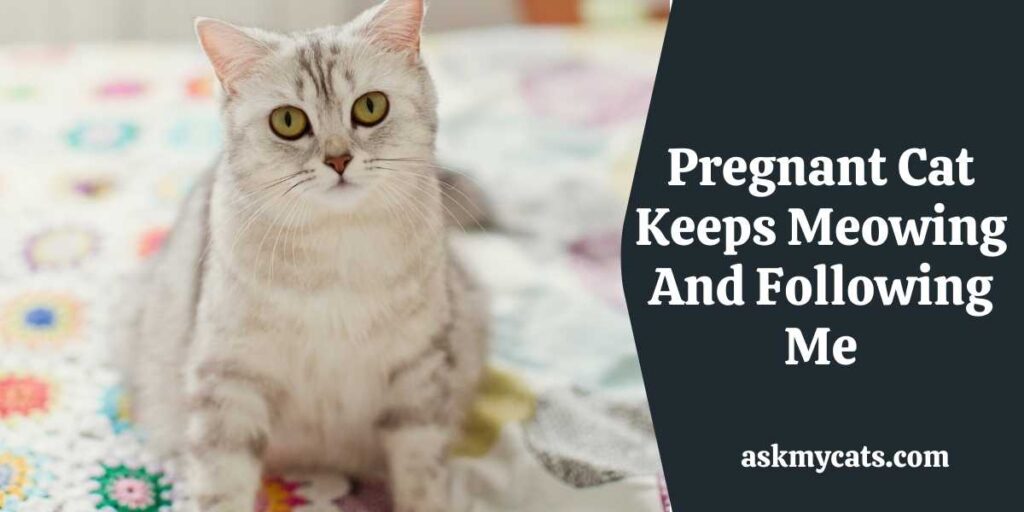Cats meow for a variety of reasons. As they mature from kittens to cats, the causes alter. When kittens are hungry, cold, or terrified, they meow to their mothers.
Cats, on the other hand, use different vocalizations to communicate with one another as they get older, such as yowling, hissing, and growling. Meowing is the only way they communicate with humans.
Pregnant cats, especially in the latter stages of pregnancy, can be rather vocal.
So, why does a pregnant cat keep meowing?
A pregnant cat can meow for several reasons including, a search for a safe place, discomfort, or when she is in labor.
After reading this article you will get to know about all the reasons why your pregnant cat is meowing.


Give Your Cat the Perfect Day
Get the Free Ebook!
Do Cats Meow A Lot Before Giving Birth?
Yes, cats do tend to meow a lot accompanied by pacing around before giving birth.

Waiting for new kittens to arrive can be both joyful and nerve-wracking for a cat owner.
Recognizing when the pregnant cat is showing signs of impending labor will help you relax and enjoy the process.
Because labor usually starts between days 58 and 65 of pregnancy, start paying attention to your cat in the weeks preceding up to her delivery.
Behavioral changes in a pregnant cat are another symptom of impending childbirth. The cat may become less active and more attached to humans than usual.
Her worries may drive her to seek refuge in your company. Pet and stroke her, and show her affection and attention to alleviate her nervousness.
A sudden change in her meowing could be a symptom of impending labor. Her normal meow will resemble that of a female cat in heat.
In response to her body’s labor signs, she may pant heavily and groom her genitals.
Cats have a 9-week gestation period, so if you know when your cat became pregnant and it’s around that time, a pregnant weeping cat could signify labor.
Though you notice a pregnant cat meowing and pacing around, as if she can’t seem to settle or get comfortable, her kittens are likely to arrive soon.
One of the most common pregnant cat indicators of approaching delivery is vocalization.
Pregnant Cat Meowing Like In Heat
A pregnant cat can be meowing as it hears due to several reasons including internal pressure on the glands.

In this condition, if a cat is pregnant (gaining weight, increasing appetite, and even producing milk), she will have kittens, but she will not have kittens in this is not the case.
She’ll go back to being in the heat in a few weeks.
Behavioral changes in pregnant cats are another symptom of impending childbirth. When she’s about to give birth, her meowing shifts dramatically.
Her meow resembles that of a female cat in heat. By panting loudly and breathing heavily, her body may also be signaling her to groom her genitals.
Your cat’s heat cycle lasts anywhere from ten to twenty days. Yowling and rolling around on the floor are common symptoms. When she becomes pregnant, she will stop doing this.
A fake pregnancy in a cat can emerge six to twelve weeks after the cat is exposed to heat and can remain for months after it is diagnosed. These are just a few of the signs of swollen mammary glands.
When ovarian tissue remains inside the body after a female cat has been neutered, it is known as an ovarian residual syndrome.
Estrogen can be produced by cat tissue, causing the cat to become heated. Unspayed cats’ ovaries produce estrogen, which is one of the hormones they produce.
It’s possible that she’s becoming more vocal, meowing for attention, affection, and comfort, or that she’s in pain due to her abdomen’s growing weight and false labor contractions.
Also, check out do kittens move alot before birth
Pregnant Cat Keeps Meowing And Following Me
The reason why your cat keeps meowing and following you is that cats may become clingy when they are pregnant due to pheromone changes.

‘Clingy’ behavior, in which your cat feels compelled to be near you and is always seeking your affection and attention.
As the date of her birth approaches, she may begin to pace and appear unusually tense or enthusiastic.
Your cat will become more attentive and clinging as the big day approaches. Young cats, especially during their first pregnancy, are prone to anxiety.
Don’t leave them alone for long periods of time. Spend a lot of time with them and spoil them rotten, even if giving birth is a natural procedure for them and they may eventually be able to do it all on their own.
Yes, they prefer to be alone on their wedding day, without the assistance of a human “midwife,” but there’s no harm in letting them know that we’ll be there for them if they need us. We receive so much love from them; now is the time to return the favor.
However, there could also be an underlying health issue. Dementia is a common symptom in senior cats, and it can also signify other health issues.
Cerebellar hypoplasia (CH) is a neurological disorder that causes cats to be extremely affectionate and attention-seeking, as well as have balance and coordination difficulties.
While having a devoted pet can be enjoyable, some cat owners find excessively clingy and demanding behavior to be aggravating.
If this is the case, you’ll need to take efforts to help your cat become more independent and less clingy.
Also, if your formerly aloof cat has suddenly become clingy, keep an eye out for other indicators that could suggest a health condition.
Any time your cat’s behavior changes suddenly, it’s a good idea to visit your veterinarian.
Determine the source of the problem. You may need to conduct some detective work, even if it seems clear.
Keep in mind that cats are extremely sensitive to change, and even something as seemingly insignificant as acquiring a new sofa or moving the furniture might cause your feline companion pain.
Consult your veterinarian. Schedule a check-up with your veterinarian if you feel health issues are at play.
They can also help you figure out if premature weaning is the source of your child’s separation anxiety and provide you advice on how to deal with it.
Must Read: Why Is My Cat Meowing/Purring After Giving Birth?
Pregnant Cat Meowing At Night
If your pregnant cat is only meowing at night, then pregnancy is not responsible for this. There could be other underlying issues like: –
1. Your Cat May Be Bored Or Unstimulated
Cats may cry at night because they’re bored — or because they haven’t had enough to eat throughout the day.
Engaged play before bedtime, as well as trying to keep their thoughts active and happy during the day, may help them sleep better at night.
It’s possible that your cat’s meowing at night is a form of attention-seeking behavior.
Although it is vital to care for your cat’s needs, giving in too frequently to their requests for attention may cause them to ask for it more regularly, so if this is a common occurrence, try not to give in too often.
If you have an indoor cat who doesn’t have access to an outside environment, you’ll need to schedule lots of playtime for them throughout the day; otherwise, they may feel neglected when you go to bed, resulting in your cat yowling at night.
2. Overactive thyroid or kidney disease
If your cat is meowing frequently at night, it’s a good idea to have them checked out by a veterinarian.
Excessive vocalization, especially at night, can indicate an overactive thyroid or kidney disease in cats.
Interesting Read: Pregnant Cat Calling As If In Heat: Know The Reasons
3. Cats are naturally more active at night
Your cat’s nighttime wailing could be due to the fact that cats are naturally more active at some times of the night.
Although it is widely assumed that cats are nocturnal, this is not the case. They are, however, crepuscular, which means they are most active at dark and dawn.
Although most cats adjust to their owners’ routines, this crepuscular inclination means that your cat may be more active in the early morning hours when the rest of the home is sleeping.
Younger cats have a higher proclivity for being active at night, as their instincts tell them it’s the best time to hunt.
However, as they grow older, their rhythm is likely to adapt to that of the rest of the household, which should imply less cat meowing at night.
As always, the first port of call should be the veterinarian’s office to ensure that your cat is in good physical condition.
They are also likely to be able to provide you with advice on how to lessen the frequency of your cat’s night meowing.
Keeping your cat busy during the day and feeding them later in the evening to keep them satiated at night, on the other hand, may have a positive effect.
Interesting Read: Why Is My Pregnant Cat Purring So Much?
Why Is My Pregnant Cat Meowing So Much?
The following are the reasons why your pregnant cat is meowing so much: –
1. Discomfort
When you see a pregnant cat meowing and restless, she’s likely merely nervous.
Pregnant cats, like pregnant women, feel discomfort as the pregnancy progresses. It’s important to note that it is referred to as discomfort rather than pain.
Cats produce litters of two to five kittens. However, some cats give birth to seven kittens squeezed inside of them.
A pregnant cat will, of course, be uncomfortable with all of those small kittens squeezed within her abdomen.
This discomfort can lead to vocalizing.
2. Seeking Comfort
Cats have a reputation for being arrogant and aloof, but usually, they are actually quite affectionate creatures.
Pregnant cats, like any other creature in distress, will vocalize in order to gain moral support from their people.
It has been witnessed that pregnant cats howled uncontrollably until their owners swept them up into their laps.
3. Pain
In fact, a pregnant weeping cat may be attempting to communicate her pain.
It’s critical to be watchful throughout the entire pregnancy process, whether it’s in a dog, cat, or human.
Keep in mind, however, that vocalization is not the sole sign of pain, and in the case of a cat, you’ll want to check for additional signals to determine whether or not the cat is in pain.
Be on the watch for other indicators of pain if you feel your pregnant cat is vocalizing due to pain.
These signs include: –
- Retreating to a solitary space
- Uncharacteristically snappy
- An arched back
- Lack of appetite
The terrible part about the symptoms stated above is that they could be caused by discomfort or just by your cat’s stomach being full of other cats. Don’t wait for more confirmation if you fear your pregnant cat is in pain.
Make an appointment with your veterinarian as soon as possible.
Also, check out How To Stop A Cat In Heat From Meowing?
Frequently Asked Questions
What is a pregnant cat’s labor sign?
If you notice your pregnant cat meowing and pacing, it’s likely that kittens are on the way. Starting a few days after delivery, your cat’s nerves will be frayed. You’ll notice your cat licking her genital and abdominal area a lot in the last 24-48 hours before delivery. She’s trying to get the space ready for her offspring by cleaning it up.
How Long Are Cats Pregnant?
A cat’s pregnancy usually lasts 65 to 69 days. This may not seem like a long time until you consider the human-to-cat age ratio. If you multiply a cat’s yearly age by seven (a rough approximation), a cat pregnancy is actually 14 months long. If, on the other hand, a pregnant one-year-old cat is assumed to be 15 years old in human years (another unsubstantiated estimate), the pregnancy duration is increased to 30 months.
How Many Kittens Can a Cat Have in One Litter?
A litter normally consists of one to ten kittens. Smaller litters of two or three kittens are more common in first-time queens. The litters of older queens are also smaller. It could also be determined by the breed; Siamese cats have large litters, whilst Persian cats have smaller litters. It’s a good idea to chat to your vet about how many kittens to expect in the litter, because a first-time mother may give birth to some but not all of her kittens, which can result in potentially life-threatening complications. More kittens can sometimes surprise pet owners, as there is usually a 10-minute to an hour gap between them.
Final Words
In the majority of the cases, where your cat is meowing, there is no reason to worry. However, in some cases, the cat could be in pain or have an underlying medical issue, so it’s best to consult a vet.
If you have any questions, ask us in the comments section.
Check out more details: Why Is My Pregnant Cat Licking Herself A Lot?
